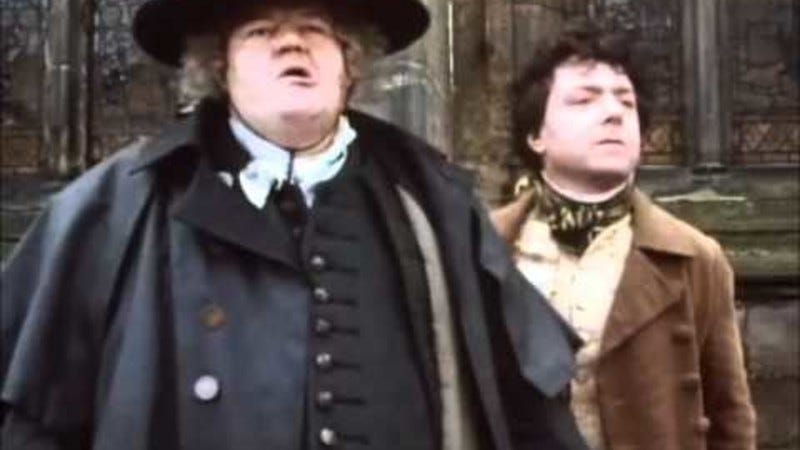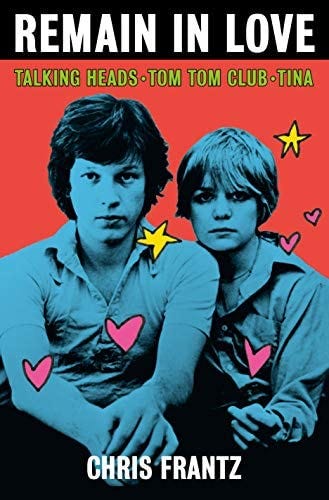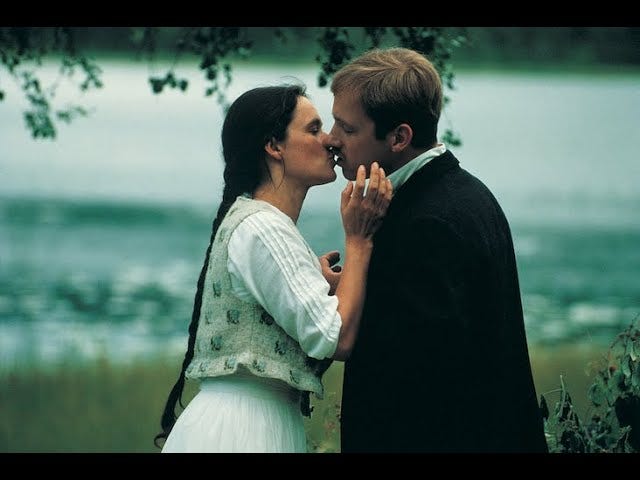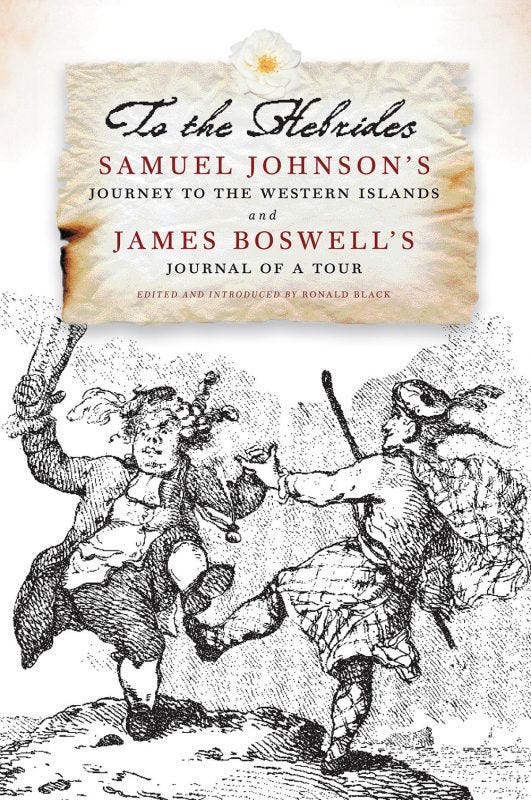This past week, I had the good fortune to be invited to appear on two rather different podcasts. The first will come as no surprise to regular readers—Patrick O’Brian superfans Mike and Ian of The Lubber’s Hole reached out to ask me on to chat about The Truelove/Clarissa Oakes, the novel they’re currently discussing, and I expect you’ll be able to hear my overexcited voice on an upcoming episode quite soon. Then, yesterday I had a splendid chat with Elias Crim of Dorothy’s Place, a podcast associated with Solidarity Hall, a left-wing Catholic media organization for “insurgent citizens.” The podcast is named for the great American journalist, activist, and anarchist Dorothy Day; Elias and his podcast partner Pete Davis bring on guests with which to further “conversation about rebuilding community and creating a moral economy.” They usually talk to activists and scholars, not poets, but Elias read my LitHub essay about Hannah and the Master and was inspired to get in touch as a kind of follow-up to his discussion of Hannah Arendt’s life and work with Arendt scholar and biographer Samantha Rose Hill (give it a listen). We talked quite a bit about Arendt and Heidegger and my book’s peculiar take on them both; we also got to chat about my novel How Long Is Now. It was really fun to take part in both interviews, one about my own work and one about the series of books that has given me more pleasure than any other.
It’s easy to take podcasts for granted; there are so many of them now, almost to the point of cliche. But what a resource for book lovers! My newest podcast crush is One Bright Book, hosted by Frances Evangelista, Dorian Stuber, and Rebecca Hussey; these intrepid cohosts set out to read “all the books, one book at a time.” They have wonderfully idiosyncratic taste, centered on small-press books and books by women; I highly recommend the most recent episode on the inimitable Kate Zambreno and can’t wait to hear their take on Norton Juster’s children’s classic The Phantom Tollbooth. My all-time favorite bookcast is Backlisted, hosted by John Mitchinson and Andy Miller, whose mission is “to give new life to old books.” What a pleasure to listen to smart and funny people talking about a book, not because some publicist pushed it but because it’s a classic ready for reappraisal, or a title fallen into undeserved obscurity. On Backlisted I learn about authors I’ve never heard of (such as Dervla Murphy, the fearless Irish travel writer whose 1965 book Full Tilt: Ireland to India with a Bicycle, is the subject of their latest episode), while enjoying deep dives and surprising insights into books I know well, like Annie Dillard’s Pilgrim at Tinker Creek, Thomas Pynchon’s The Crying of Lot 49, or, yes, Proust. They bring on delightful guests commenters, and the British accents are just a bonus.
At the top of every episode of Backlisted, before John and Andy get into the main book, they ask each other, “What have you been reading?” In the spirit of that question, as a kind of preface to my forthcoming newsletter on the sixteenth Aubrey-Maturin novel, The Wine-Dark Sea, I thought I’d share some thoughts on what’s absorbed me recently, and invite y’all to comment on what you’ve been reading, should you care to do so.
Remain in Love by Chris Frantz (St. Martin’s Press, 2020)
I’ve never been what you would call a music guy. Coming up in the 1980s, I was too nerdy to take my identity from the bands I loved, the way so many of my peers did. My tastes were questionable: I neglected the birth of hiphop for the sake of of prog rock, particularly Jethro Tull and Yes; the more bombastic and pseudo-operatic a band was, the better, so I also listened to The Who and Led Zeppelin and Queen a lot, though I was deaf to the latter’s campiness. I liked Bowie, but only his poppier incarnations; I didn’t find out about Heroes or Low until I was embarrassingly old. Now that I write this down, I see that all my favorite rock musicians were Brits, operating at an ironic distance from the music’s American roots. It’s like Emerson said: “In every work of genius we recognize our own rejected thoughts; they come back to us with a certain alienated majesty.”
All this to say that, though I listened to Talking Heads, I wasn’t a knowledgable fan, nor did I have much understanding of the New York New Wave scene from which they emerged. I would never in a million years have associated them with the Ramones, even though, as Frantz’s memoir reveals, the two bands had remarkably similar family dynamics. Not until I was deep into adulthood would I discover Television and Jonathan Richman and the New York Dolls; I went into everything backwards (I knew Lou Reed’s solo work long before I listened to the Velvet Underground, for instance). The Eighties were like a thick glaze, a quicksand through which I slogged, mindlessly humming the product you now hear in grocery aisles: Simple Minds, Tears for Fears, Mr. Mister, et al.
Nowadays I can’t get enough Talking Heads; they and Elvis Costello are always in the heaviest rotation when I’m in the kitchen; that or old soul records. Reading Frantz’s memoir, I find a lot to recognize. They were, famously, art school kids, middle-class kids from intact suburban families; weirdly, both Frantz and Tina Weymouth were the children of high-ranking military men (though Tina’s dad became an anti-nuclear activist, so good for him I guess). Frantz’s blithely cheerful and straightforward narration only hiccups when he and the other Heads bump into the class barriers that separated them from other major figures of the much-mythologized late 70s New York scene. Here’s what happened when they met Patti Smith for the first time:
She looked us over while snapping her chewing gum and said, “Oh, yeah. You’re that art school band. I wish my parents were rich enough to send me to art school.” She turned and started talking to someone else. That was it, end of conversation. It was not the conversation we had been hoping for.
Touring in Europe in ‘77 with the Ramones (these chapters are among the best in the book), Frantz makes hay out of the cultural discomfort of the kids from Queens, especially Johnny, who is freaked out by the existence of lettuce that isn’t of the iceberg variety, bemoans his inability to get a hamburger, bullies the others for talking about art, and declares even the spectacular scenery “grim.” “It was April in Paris,” Frantz writes, “and we had the day off, so Tina, David, Jerry, and I decided we would explore while the Ramones went to McDonalds.” I don’t know if Frantz has the least awareness of how snobbish he sounds, or how much of the Ramones’ primal appeal is rooted in their sheer outer boroughness. At the same time, I have to admit that my art-loving bougie heart is much more similar to that of Frantz and Weymouth—probably closer even than it is to David Byrne, whose autistic genius moves me deeply. I too have played tourist in St. Germain, “walking the same streets and alleyways as the beat poets, the great jazz cats, the Existentialists, the Surrealists, and Ernest Hemingway.” And if someone had caught me sneaking into a McDonalds for un royal with cheese, I would have been heartily ashamed.
Frantz writes compellingly about the gritty years in New York: the rats, the dogshit, the bodies in the streets. But this doesn’t shake my sense that Talking Heads were fundamentally tourists. If music-making hadn’t worked out for them, they would undoubtedly have returned to the suburbs from whence they came and lived successful conventional lives. Chris Frantz seems to have been born to be happy; it seems almost a matter of chance that he got to live his best life as a rock drummer. He never seems to have seriously questioned the bourgeois values that enabled him to remain in love with the same woman for forty years. What bile he’s able to summon is reserved for Byrne, who behaved perfectly disgracefully in any number of ways. But Frantz, who makes up in generosity what he lacks in perspicuity, still respects and admires Byrne’s musicianship and quirky genius.
I may not finish this book. The other rock ‘n roll memoirs I’ve read—Bruce Springsteen’s Born to Run, Keith Richards’ Life—are fascinating when recounting their authors’ early days, when they’re still just young dudes with a guitar and a dream. Once they become stars, it’s just one album after another, one tour after another, and their problems become a lot less, shall we say, relatable. I suspect the same is true of this book, which ought to bear the subtitle, “Memories of a Happy Man.” But the story of any artist’s self-fashioning as told by the artist will always be interesting to me.
The Magic Lantern by Ingmar Bergman, translated by Joan Tate (Penguin 1988)
Speaking of artistic self-fashioning, the other memoir that’s fallen into my lap (I got both of these books used at Bookends and Beginnings, Evanston’s gem of an independent bookstore) is Ingmar Bergman’s deliriously strange autobiography; I wanted to show my own photo of the cover so that you can make out Dirk Bogarde’s peculiar blurb: “A passionate, caring book about a very particular man, I urge you to read it.” Am I wrong in detecting a bit of a backhanded compliment there? Bergman is unflinching in his depiction of his most monstrous qualities: a perfectionistic tyrant who betrayed one woman after another, one child after another, in pursuit of an artistic vision paradoxically driven by immense compassion for his characters, if not for the people who helped him make his films and put on his plays. It’s utterly absorbing, particularly the stories of Bergman’s childhood in which the enchantment of the Swedish countryside stands cheek-by-jowl with the violent repression inflicted by his parents, an unhappy yet successful Lutheran minister, and his even more unhappy wife.
My relationship to Bergman’s cinema is a bit similar to my relationship with Talking Heads; seemingly distant, more a question of admiration than love, until I start to think about it. When I was in my twenties I saw The Best Intentions (probably at the Angelika or Film Forum), a film written but not directed by Bergman about the relationship of Bergman’s parents, from their first meeting up until the moment Ingmar himself is born. I want to watch it again. Whereas the semi-autobiographical Fanny and Alexander (1982), which Bergman intended to be his final film, is harsh in its depiction of Bergman’s miserably strict parents, The Best Intentions is far more compassionate, and seems to represent a genuine attempt to understand how two fundamentally admirable people could have made each other and their children so miserable. I am reminded a little of my two novels, which together represent my attempt to come to terms with who my parents were and how the lives they lived before I was born have shaped and continue to shape me. I wonder if seeing this film the year it came out—the year my mother died, 1992—didn’t plant the seeds of those novels in my soul.
To the Hebrides: Samuel Johnson’s Journey to the Western Islands and James Boswell’s Journal of a Tour, edited Ronald Black (Birlinn 2012)
The ne plus ultra of book chat is talking about books you haven’t actually read. In this case I’m only sort of doing that; I haven’t read this particular edition that cleverly combines Johnson’s rather dry account of the famous journey with Boswell’s far livelier version of the same events. But I have read Boswell’s The Journal of a Tour to the Hebrides, folded into my whomping big edition of The Life of Johnson, and I’ve dipped into Johnson’s A Journey to the Western Isles of Scotland. Not too long ago, I enjoyed the 1993 TV movie Boswell & Johnson’s Tour of the Western Isles, with the late, great Robbie Coltrane as Johnson (he also played the Great Cham on Blackadder) and John Sessions as Boswell. (It may seem odd to have cast a famous Scotsman as the famously Scots-scorning Johnson, but Coltrane pulls it off beautifully.)
I discovered the combined edition on yet another podcast, Ear Read This, an Edinburgh-based show that ranges pretty widely among the classics: recent episodes were devoted to Sylvia Plath, Ovid, and Raymond Chandler. Hosts Adam and Ash talk Boswell & Johnson in this 2019 episode—it’s an entertaining listen. Stumbling across it, I was reminded of my love for the odd couple Boswell and Johnson make: the brash, horny young diarist eager for fame, and the much older, very famous, very learned scholar, poet, and depressive. Life of Johnson is one of my favorite all-time books, and I’m also fond of Boswell’s diaries, particularly the ones from when he was a very young man on the loose for the first time in London and on the continent. There’s something irresistible about the jousting, sometimes scratchy relationship between two such fundamentally different personalities, a relationship nonetheless filled with real liking and esteem.

Sounds familiar, doesn’t it? Yes, Boswell and Johnson are the original, real-life Aubrey and Maturin, though they were far from nautical; as Johnson once quipped, “No man will be a sailor who has contrivance enough to get himself into a jail; for being in a ship is being in a jail, with the chance of being drowned.” I have no doubt that Patrick O’Brian knew the writings of both men backward and forward; Johnson’s prose was a major resource for O’Brian’s uncanny ventriloquism of eighteenth-century literary style. O’Brian read bound editions of Gentleman’s Quarterly as a boy while confined to bed by asthma, and the vigorous rhythm of Johnson’s writing, as seen in his famous letter to Lord Chesterfield, was a major inspiration. This could be Stephen Maturin in one of his rare fits of high dudgeon:
Is not a patron, my lord, one who looks with unconcern on a man struggling for life in the water, and when he has reached ground, encumbers him with help? The notice which you have been pleased to take of my labours, had it been early, had been kind: but it has been delayed till I am indifferent and cannot enjoy it; till I am solitary and cannot impart it; till I am known and do not want it.
The vagaries of male friendship have become a major subject with me. I’m fascinated by unlikely pairings of the sanguine and the melancholic, of the visceral with the intellectual, and with the real if usually unexpressed need one man can feel for his apparent opposite. Ash and Adam observe that the journey of Boswell and Johnson to the Hebrides—sometimes uncomfortable, sometimes leavened by a host’s awe at Johnson’s fame, often awkward and frequently hilarious—is the prototype of The Trip, a film series I love nearly as much as the Aubrey-Maturin books. Take two guys, fundamentally unalike yet, yin and yang, and put them on the road (or in a ship) together, and watch the sparks fly! With, in Boswell & Johnson’s case, as with Aubrey & Maturin’s or Steve Coogan’s and Rob Brydon’s, a deep undercurrent of timor mortis conturbat me.
Twitter at its best has been a wonderful resource for book chat; I wonder whether that can continue to be true now that it’s the personal property of a certain egomaniacal shitposter. Thankful at least for Substack and podcasts and the alternatives they make available; let a thousand flowers bloom!








